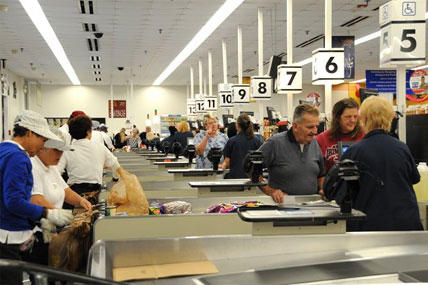A new grocery store comparison study by the Defense Commissary Agency (DeCA) found that using the commissary saves shoppers an average of 30.5 percent annually when compared to other stores.
"It's not enough for us to say that the commissary is worth the trip and a significant part of the military's total compensation package," DeCA director Joseph Jeu said in a statement released Jan. 9. "This study proves our overall savings hold up across a much wider retail landscape."
In past years the commissary has compared its prices only with traditional grocery retailers within commuting distance, commissary officials said.
This year, however, they expanded their comparison study to wholesalers, such as Sam's Club, convenience stores like Dollar General, and drug stores that carry food.
The 30.5 percent average savings was found when officials compared 37,000 grocery items that carry Universal Product Codes (UPCs) at 30 stateside commissaries with the same products at those civilian stores. The study was conducted over a 26-week period that ended June 22, 2012.
The study did not compare prices of meat packaged in-store because it does not have UPC symbols, despite many shoppers label meat savings as the top reason they shop at the commissary.
In 2012, the study found an average savings of 31.2 percent when compared to only traditional grocery stores.
The new study comes as DeCA works to produce a plan for closing all stateside commissaries at the request of the Defense Department.
"The new price study confirming the 30 percent commissary savings is critical and timely given the disheartening news that the Pentagon is considering a proposal to close all commissaries in the United States," said Candace Wheeler, a spokesperson for The Coalition to Save Our Military Shopping Benefits, which lobbies on behalf of the commissary.
Because the study only looks at products both the commissary and civilian stores carry, it cannot capture how much a shopper would save by buying the less expensive civilian store brand. For example, a survey done by Military.com's SpouseBuzz blog last year found that a can of sweet corn at the commissary is $.79. But a shopper can save an additional $.10 by purchasing Walmart's store brand version of the product instead.
The commissary does not carry its own store brand product line.
Some shoppers told Military.com that not comparing the commissary name-brand items to the cost of the generic brand at a civilian retailer skews the study.
"The commissary is a Catch-22 in my opinion. Their meat and produce are great. Some deals are awesome, but they don't have a cheap store brand that so many military families use to save money," said Raelene Mauk, an Army spouse at Fort Campbell.
Whether or not the commissary actually saves users an average of about 30 percent is a constant source of debate among shoppers. However, most say they do find some savings at the commissary.
"I know that overall when I go to Walmart and spend about $200 on groceries, I spend about $130ish at the commissary for the same things," said Julianne Davis, an Army spouse at Fort Bragg. "There are some items that are less at the commissary and some items that are the same price. But rarely are they more."
"We save on meet, fruit, veggies, dairy," said Sarah Forrester, an Army spouse at Fort Campbell. "We try to avoid stuff in the middle of the store including box and pre made stuff. We couldn't afford to shop at Walmart or places like that. ... The commissary saves us $200-$300 a month."
However, some said when they take into account the commissary's five percent order surcharge and tipping the baggers, a non-required but generally accepted practice, shopping off-base costs less.
"That 5 percent surcharge isn't doing me any favors by adding 5 percent to my bill just by walking in the door," Army spouse Amanda Griffiths said.





























